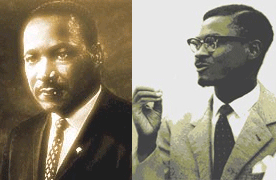
Remembering King and Lumumba: Two Martyrs of Our Time
By Theodore T. Hodge
Thodge@theperspective.org
The Perspective
Atlanta, Georgia
January 17, 2005
 |
|
Martin Luther King (L), Patrick Lumumba (R)
|
Both men were born only four years apart; Patrice Lumumba was born in 1925 and Dr. King in 1929, making them generational peers or contemporaries. Although born thousands of miles apart, in different societies, they had the same calling: to struggle against oppressive forces that were determined to keep their people down. Specifically, King fought for dignity, justice and equality for African Americans while Lumumba fought for liberation and freedom for the Congolese Africans; in general, they both fought for oppressed and down trodden people everywhere and against all oppressive forces.
Though cut down in the prime of their lives, they reached the pinnacle of their careers, serving mankind as can be evidenced by the fact that Dr. King was awarded the coveted Nobel Peace Prize; his birthday is a national holiday in the country that remained hostile to his message and philosophy for so long. Honoring Dr. King in such a momentous way is a clear indication of his philosophy that good eventually overcomes evil; he was the good guy. That much is evident.
Patrice Lumumba also reached a remarkable height before being senselessly destroyed in what has remained a topic by conspiratorial theorists since his untimely demise. Most know why he was killed: He was determined to affect the balance of powers in his country; to restore the rights and dignity of his countrymen in their homeland. He fought colonialism in general and the Belgian State in particular. He succeeded by leading Congo out of the colonial control imposed by foreign powers. He was elected the first Prime Minister before his life was cut short. But who killed him? That has remained the proverbial “million-dollar-question” over the past forty-plus years. Now the pieces of the grand puzzle are being assembled. It goes down as one of the saddest in our times.
Since his death, conspiratorial theorists as well as journalists and scholars familiar with the story, have pointed fingers at the Belgian government, the American CIA and others. Of course, as to be expected, such theories have been vehemently denied by the great powers to be. But recently, internal CIA documents that have remained hitherto classified, have been partially declassified. And yes, the American CIA and the Belgian government did have a hand in the murder of Comrade Patrice Lumumba! Stephen R. Weisman writing in the Washington Post on 21 July 2002 under the heading, “Opening the Secret Files on Lumumba’s Death” had this to say:
“In February, Belgium, the former colonial power in Congo, issued a thousand-page report that acknowledged "an irrefutable portion of responsibility in the events that led to the death of Lumumba. Unlike Belgium, the United States has admitted no such moral responsibility. Over the years, scholars (including myself) and journalists have written that American policy played a major role in the ouster and assassination of Lumumba. But the full story remained hidden in U.S. documents, which, like those I have examined, are still classified despite the end of the Cold War, the end of the Mobutu regime and Belgium's confession.”
Although “the United States has admitted no such responsibility”, this is what the a select committee of the US Senate to study government operations with respect to intelligence activities, headed by Senator Frank Church of Idaho in 1976 concluded:
“The Committee finds that officials of the United States Government initiated and participated in plots to assassinate Patrice Lumumba and Fidel Castro.
“The plot kill to Lumumba was conceived in the latter half of 1960 by officials of the United States Government, and quickly advanced to the point of sending poisons to the Congo to be used for the assassination.”
Today, as we commemorate the legacy of Dr. Martin Luther King, Jr., we must also remember other freedom fighters whose lives were also prematurely cut short only because they had the audacity to fight for freedom; because they had the foresight and courage to demand justice, freedom and equality for all, fundamental principles upon which this country were founded. His Excellency Patrice Lumumba was such a hero. Today is the anniversary of his assassination by the forces of evil.
Both of these gentlemen left us a grand reservoir of wise and inspirational sayings, now it becomes our collective challenge to live by the wisdom they expressed and the commitment they demonstrated despite the odds against them. For example, Dr. King reminded us: “Freedom is never voluntarily given by the oppressor, it must be demanded by the oppressed.”
Patrice Lumumba, facing certain death was defiant.
In his last letter penned, this is what he wrote:
“No brutality, mistreatment, or torture has
ever forced me to ask for grace, for I prefer to die
with my head high, my faith steadfast, and my confidence
profound in the destiny of my country, rather than
to live in submission and scorn of sacred principles…
“Do not weep for me, my dear companion. I know
that my country, which suffers so much, will know
how to defend its independence and its liberty. Long
live the Congo! Long live Africa!”
It takes a great mind and spirit to be faced with
the threat of execution, yet stand strong and inspiring
for loved ones, friends, comrades and countrymen.
Both Dr. King and Lumumba demonstrated such strength.
They did not see their fights as personal battles
but battles for the masses. Have the African masses
risen to the challenge of their immortal words? We
must remember them as martyrs, because they led selfless
lives and sacrificed themselves for the greater good
of mankind everywhere.
